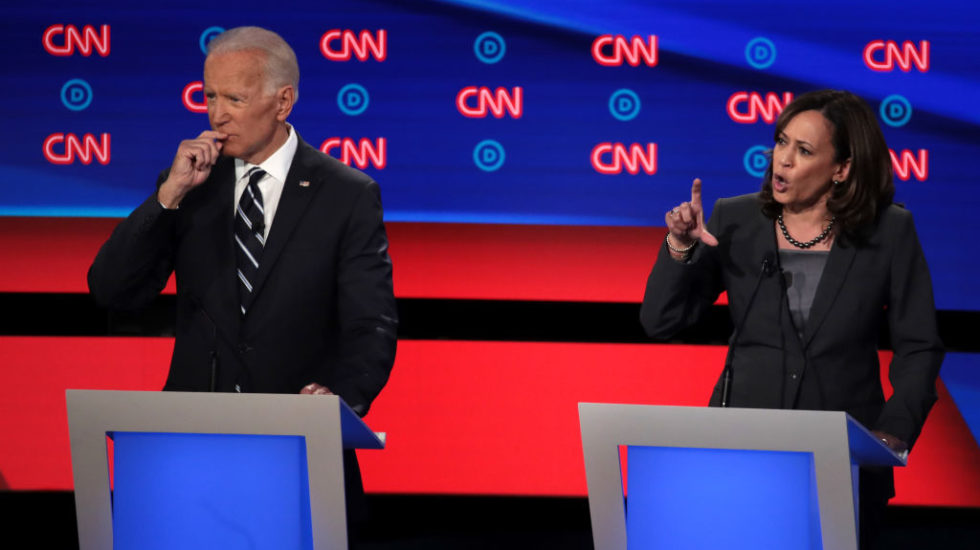Sometimes it seemed like a shirt-and-tie scrum, with nine Democratic candidates for president pounding away on top, and Joe Biden on the bottom.
The former vice president didn’t always acquit himself well.
It began to seem that with nearly every question posed by the CNN moderators at Wednesday night’s second Democratic presidential debate in Detroit (part 2), the responding candidate managed to reshape it into some implied or direct criticism of Biden.
And unlike the first round in June, Biden’s main antagonist was not Sen. Kamala Harris (CA). It was all of them.
Harris was, in fact, far more subdued than in the first debate — and seemingly less called upon by the moderators, though she in fact spoke more than anyone else on stage except Biden, who answered questions and sparred with opponents for some 21 minutes during the more than 2 ½ hour broadcast.
One reason Biden got so much airtime is that he was often called upon to respond to other debaters’ criticisms — mostly about things he said and did years ago, as Barack Obama’s vice president and earlier.
This left him wide open to a failure of perspective on the past, which was apparent to the other candidates and surely to the huge television audience. He did not always handle it well, even though his handlers must have fully prepared him for his opponents’ lines of attack.
Characteristically, he repeatedly hesitated, misspoke, fumbled words and occasionally looked confused.
Biden, still the top-polling Democrat in the field, and Harris, were joined on stage by Sens. Michael Bennet (CO), Cory Booker (NJ) and Kirsten Gillibrand (NY); Rep. Tulsi Gabbard (HI); Gov. Jay Inslee (WA); Mayor Bill de Blasio (New York City); former HUD Secretary Julián Castro; and entrepreneur Andrew Yang.
“Booker arguably surpassed Harris as Biden’s primary antagonist on Wednesday night, attacking the former vice president for refusing to condemn the high number of deportations [of illegal immigrants] carried out under the Obama administration,” says Axios.
“You invoke President Obama more than anybody in this campaign, Booker said. “You can’t do it when it’s convenient and dodge it when it’s not.”
As with Tuesday night’s debate, the moderators began with questions about health care, and the ensuing discussion went on for half an hour.
Biden immediately went on offense, chiding Harris “for what he said was her shifting stances on healthcare and for a new Medicare-for-all plan that Biden said sought to hide the true costs,” says the Washington Post.
“To be very blunt, and to be very straightforward, you can’t beat President Trump with double-talk on this plan,” Biden said.
Some candidates focused on the claim that Americans who have health insurance through their employers are happy with their plans and wouldn’t want Medicare-style coverage that would boost taxes.
“There’s this mythology that somehow all these folks are in love with their insurance in America,” said de Blasio, noting that “many have horror stories about insurance companies failing to cover major parts of critical procedures,” says the Post.
There was unanimous agreement among the candidates that limiting President Trump to one term is the crucial goal of Democrats.
“We can no longer allow a white nationalist to be in the White House,” said Inslee. “We have to make America what it’s always been: a place of refuge.”
But there was a clear split on the question of impeachment.
Harris, Booker and Castro argue there is plenty of evidence to pursue impeachment against Trump.
“There are 10 clear incidents of obstruction of justice by this president, and he needs to be held accountable. I’ve seen people go to prison for far less,” Harris said, citing the Mueller report.
Others, like de Blasio and Bennet, cautioned that impeaching the president, only to have the Republican-led Senate almost certainly fail to convict him, would harm Democratic prospects in 2020.



